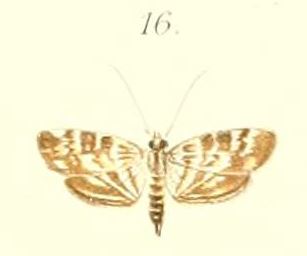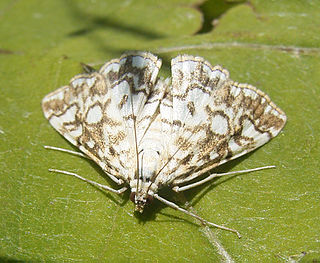
Pyraustinae is a large subfamily of the lepidopteran family Crambidae, the crambid snout moths. It currently includes over 1,400 species, the majority of them tropical but some found in temperate regions including both North America and Europe.

Spilomelinae is a very species-rich subfamily of the lepidopteran family Crambidae, the crambid snout moths. With 4,132 described species in 340 genera worldwide, it is the most speciose group among pyraloids.

The Angeronini are a small tribe of geometer moths in the subfamily Ennominae. The tribe was first described by William Trowbridge Merrifield Forbes in 1948. As numerous ennomine genera have not yet been assigned to a tribe, the genus list is preliminary.

Omiodes is a moth genus in the family Crambidae. Several species are endemic to Hawaii.

Tabidia is a genus of moths of the family Crambidae described by Pieter Cornelius Tobias Snellen 1880.

Autoba is a genus of moths of the family Erebidae. The genus was erected by Francis Walker in 1863.

Abraxas, the magpie moths, is a genus of moths in the family Geometridae. It was first described by William Elford Leach in 1815.

Hydrelia is a genus of moths in the family Geometridae erected by Jacob Hübner in 1825.

Oenochroma is a genus of moths in the family Geometridae erected by Achille Guenée in 1857.
Parasynegia is a genus of moths in the family Geometridae first described by Warren in 1893.

Pero is a genus of moths in the family Geometridae erected by Gottlieb August Wilhelm Herrich-Schäffer in 1855.

Sarcinodes is an genus of moths in the family Geometridae erected by Achille Guenée in 1857. The species are large with pinkish, mauvish or brownish-gray body and wings. The wings are traversed by between one and three oblique, straight fasciae. The forewing apex is acute, slightly falcate. The male antennae are unipectinate, those of the female are typically filiform, in some species unipectinate. The species are found in east Asia.

Oenochrominae is a subfamily of the moth family Geometridae.

Trichopterygini is a tribe of geometer moths under subfamily Larentiinae. The tribe was described by Warren in 1894.

Eupitheciini is a tribe of geometer moths under subfamily Larentiinae, often referred to as pugs. The tribe was described by Tutt in 1896.
Desmobathrinae is a subfamily of the moth family Geometridae described by Edward Meyrick in 1886.

Acentropinae is a fairly small subfamily of the lepidopteran family Crambidae, the crambid snout moths. Species of this subfamily are exclusively found in wetlands and aquatic habitats.
William Warren was an English entomologist who specialised in Lepidoptera.
Rhodostrophiini is a tribe of the geometer moth family (Geometridae), with about 200 species in 17 genera and five genera tentatively associated with the tribe.

Cybalomiinae is a subfamily of the lepidopteran family Crambidae. It was described by Hubert Marion in 1955.














